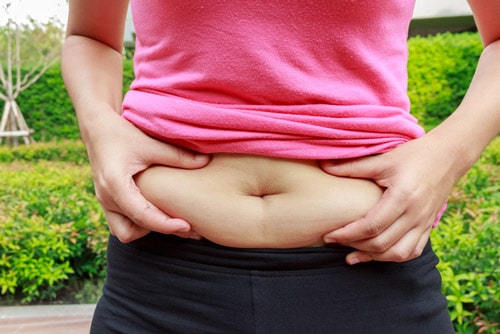How to distinguish between fat vs bloating?
How to distinguish between fat vs bloating?
Blog Article
Exploring the Distinction Between Bloating and Fat: Essential Insights for Better Digestive Health And Wellness
Comprehending the difference between bloating and body fat is crucial for people looking for to enhance their digestion health and wellness. While bloating is frequently a short-term condition linked to nutritional habits, body fat stands for a much more secure element affected by lasting way of living choices.
Comprehending Bloating
Moreover, bloating can be exacerbated by conditions such as cranky bowel syndrome (IBS) or food intolerances, where the gastrointestinal system battles to refine particular compounds effectively. Eating also swiftly, taking in carbonated beverages, or overindulging can also set off bloating by enhancing the volume of gas and food within the stomach and intestinal tracts.
Stress and hormone changes can affect digestive tract mobility and add to bloating as well. Acknowledging the triggers particular to an individual's way of life and diet plan is important for handling this problem. In general, comprehending the complex sources of bloating is essential for developing efficient approaches to relieve pain and boost digestive system health and wellness.
What Is Body Fat?
Body fat, an essential element of human physiology, serves several functions past just being a source of energy storage. Composed primarily of adipocytes, or fat cells, body fat plays a vital function in preserving total health and wellness. It is classified into two key types: subcutaneous fat, located just below the skin, and natural fat, which borders inner organs. Each kind has unique ramifications for wellness and metabolic process.
Along with energy storage, body fat is essential to hormone law, insulation, and defense of important organs - bloating vs fat. It works as a reservoir for fat-soluble vitamins, such as A, D, E, and K, facilitating their absorption and metabolic use. Furthermore, fat is metabolically active, creating hormonal agents like leptin and adiponectin, which are associated with appetite law and insulin sensitivity.

Body fat also plays a duty in thermoregulation, helping to maintain body temperature. While some quantity of body fat is essential for wellness, extreme build-up can lead to problems such as weight problems, diabetes, and cardiovascular illness. Comprehending the intricacies of body fat is important for promoting far better health and preventing condition, highlighting the significance of balanced body structure.
Secret Differences In Between Bloating and Fat
Frequently misinterpreted, bloating and body fat are two distinct conditions that can influence a person's look and comfort. Bloating describes an uncomfortable swelling in the abdominal location brought on by too much gas or liquid retention, resulting in a short-term rise in dimension. This problem can vary throughout the day, frequently connected to dietary selections or digestion concerns, and is defined by feelings of volume or stress.
In Resources comparison, body fat is a stable element of body composition, standing for kept power and playing an important function in different physiological features. Unlike bloating, body fat does not generally change swiftly and is influenced by long-lasting nutritional habits, task levels, and metabolic factors. It builds up gradually, adding to overall body shape and health.
In addition, while bloating can trigger discomfort and may be relieved through nutritional changes or way of living adjustments, body fat reduction typically needs a more extended commitment to diet regimen and workout - fat and bloating. Acknowledging these distinctions is important for understanding one's body and handling wellness effectively, as each condition necessitates distinctive methods for enhancement and relief
Root Causes Of Bloating
Bloating can occur from a variety of underlying variables, each adding to the unpleasant experience of fullness and abdominal swelling. One primary reason is the consumption of air, which can take place while eating or consuming as well promptly. This excessive air can gather in the digestive system tract, resulting in pain.
In addition, particular foods are notorious for triggering bloating, specifically those high in fiber, such as beans, lentils, and cruciferous veggies. These foods can lead to boosted gas production during digestion. Lactose intolerance is one more significant contributor, as people lacking the enzyme lactase might experience bloating after taking in milk products.
Furthermore, man-made sweeteners, specifically sugar alcohols, can disrupt gut function and trigger bloating. Intestinal conditions, such as cranky digestive tract syndrome (IBS) and celiac illness, can likewise show up as bloating because of impaired digestion or swelling.
Hormone variations, especially throughout menstruation, can lead to momentary bloating also. Stress and anxiety and anxiousness can aggravate digestion concerns, further adding to the sensation of bloating. Recognizing these reasons is vital in resolving and minimizing this usual discomfort.
Tips for Handling Digestive Health
Dealing with the elements that contribute to helpful resources bloating is just the beginning of promoting far better digestive health and wellness. Foods such as fruits, veggies, and whole grains promote routine digestive tract movements and decrease the chance of constipation, a typical trigger for bloating.
Hydration plays an essential duty too; sufficient water consumption helps the digestive system function ideally and can relieve bloating. bloating and fat. Furthermore, exercising conscious eating-- such as chewing food completely and eating gradually-- why not try here can help in food digestion and reduce air ingesting, which frequently exacerbates bloating

Lastly, integrating probiotics right into your regimen, whether with supplements or fermented foods, can foster a healthy intestine microbiome, further supporting digestive processes. By welcoming these methods, people can attain a more well balanced and comfy gastrointestinal experience.
Conclusion
In verdict, distinguishing between bloating and body fat is essential for maximizing digestion health and overall health. Bloating, often a temporary problem linked to dietary choices, contrasts with body fat, which reflects long-lasting way of life practices.
Report this page